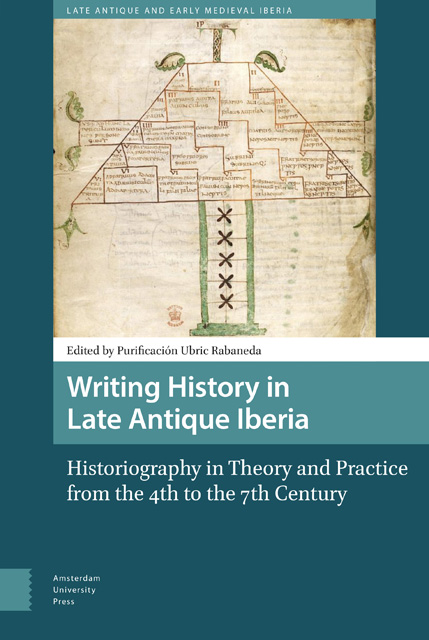 Writing History in Late Antique Iberia
Writing History in Late Antique Iberia Book contents
- Frontmatter
- Table of Contents
- 1 Writing History in Late Antique Iberia: Theory and Praxis
- 2 Para qué sirve la Historia : Principios teóricos de la historiografía hispana tardoantigua
- 3 From Christian Historiography to the Emergence of National Histories : Spanish Historiography between Romans and Visigoths
- 4 Orosius: An Iberian Patriot’s History of Rome
- 5 Orosius, Barbarians, and the Christian Success Story
- 6 Prophecies and Omens of the Fall of the Roman Empire in the Chronicle of Hydatius of Lemica
- 7 La dimensión política de los historiadores del reino visigodo de Toledo
- 8 The Definitions and Uses of Historia in Isidore of Seville
- 9 Bishops and Their Biographers : The Praxis of History Writing in Visigothic Iberia
- 10 Local Powers and Construction of the Past in the Visigothic Kingdom of Hispania
- 11 The Contemplation of the Past in the Libellus Precum of Faustinus (and Marcellinus)
- 12 Orthodoxy and Heterodoxy : The Historiography of Hispania in Late Antiquity
- 13 Expulsados de la Historia : El argumento histórico en la polémica antijudía hispana (siglos IV-VII)
- 14 Consideraciones sobre la temporalidad en las Vitae Sanctorum visigóticas
- 15 The Image of Leovigild as Arian Monarch in the ‘Vitas Patrum Emeritensium’ : From Historical Reality to Hagiographical Deformation
- Index
8 - The Definitions and Uses of Historia in Isidore of Seville
Published online by Cambridge University Press: 18 April 2023
- Frontmatter
- Table of Contents
- 1 Writing History in Late Antique Iberia: Theory and Praxis
- 2 Para qué sirve la Historia : Principios teóricos de la historiografía hispana tardoantigua
- 3 From Christian Historiography to the Emergence of National Histories : Spanish Historiography between Romans and Visigoths
- 4 Orosius: An Iberian Patriot’s History of Rome
- 5 Orosius, Barbarians, and the Christian Success Story
- 6 Prophecies and Omens of the Fall of the Roman Empire in the Chronicle of Hydatius of Lemica
- 7 La dimensión política de los historiadores del reino visigodo de Toledo
- 8 The Definitions and Uses of Historia in Isidore of Seville
- 9 Bishops and Their Biographers : The Praxis of History Writing in Visigothic Iberia
- 10 Local Powers and Construction of the Past in the Visigothic Kingdom of Hispania
- 11 The Contemplation of the Past in the Libellus Precum of Faustinus (and Marcellinus)
- 12 Orthodoxy and Heterodoxy : The Historiography of Hispania in Late Antiquity
- 13 Expulsados de la Historia : El argumento histórico en la polémica antijudía hispana (siglos IV-VII)
- 14 Consideraciones sobre la temporalidad en las Vitae Sanctorum visigóticas
- 15 The Image of Leovigild as Arian Monarch in the ‘Vitas Patrum Emeritensium’ : From Historical Reality to Hagiographical Deformation
- Index
Summary
Abstract
Isidore of Seville is an exceptional witness to analyse the purpose of historia production in late Antiquity. The analysis of uses of the term historia by the Bishop of Seville, which he mentions more than one hundred times in his works, leads us to distinguish three different aspects. The first one is that of the definition of historia about the past as a literary genre based on classical standards. The second one is an exegetical reflection on the plural readings of the historia of a biblical text. The third one concerns the specific usages that Isidore makes from the data provided by historia , whether it is sacred or profane, in order to produce texts aiming to describe the etymologies of words or the human past.
Keywords: Isidore of Seville, historiography, Late Antiquity
Isidore of Seville is an exceptional witness with respect to analysing the purpose of historia production in late Antiquity. He wrote a Chronicon and stories of the Germanic peoples settled in Spain. In his Etymologies , he defined the various genres of writing historia about the past in service of his cultural project. Finally, there are many references to historia in the De ecclesiasticis officiis , the Liber differentiarum , the De natura rerum , the De fide catholica contra Iudaeos , and the Sententiae .
We can distinguish three different aspects from the Bishop of Seville’s works, which mention uses of the term historia more than one hundred times. The first aspect is the definition of historia as a literary genre based on classical standards. The second is an exegetical reflection on the plural readings of the historia of a biblical text. The third aspect concerns the specific usages that Isidore discerns from the data provided by historia , whether sacred or profane, in order to produce texts aimed at describing the etymologies of words or the human past.
Explicit definitions of historia as a literary genre
Definitions of historia as a literary genre are mainly found in the Etymologies , in particular in chapters 41 (De historia ) and 44 (De generibus historiae ) of book I. They include various classical data that coexist but that are not always harmonised.
- Type
- Chapter
- Information
- Writing History in Late Antique IberiaHistoriography in Theory and Practice from the 4th to the 7th Century, pp. 139 - 154Publisher: Amsterdam University PressPrint publication year: 2022


